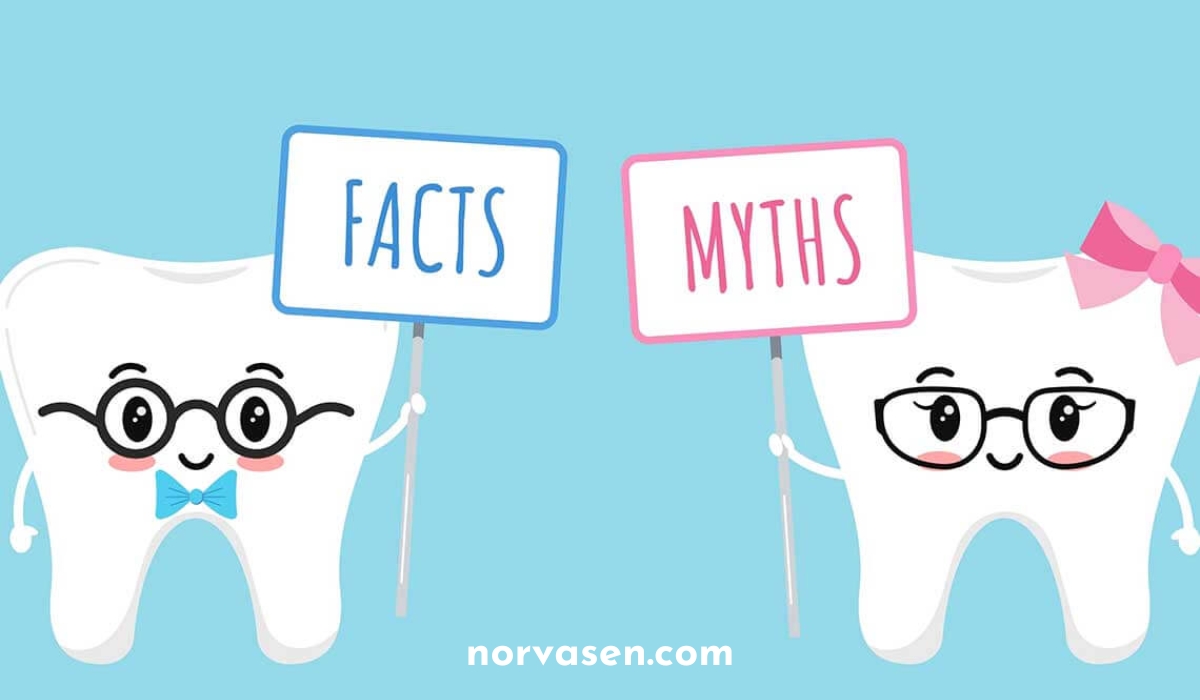Health
Top Dental Health Myths Debunked

Ahh, the world of the internet is a marvelous thing! Within seconds, you can have answers to all your burning questions about the important things in life, like your dental health.
But along with those answers comes a massive amount of incorrect information that started because of a myth. So, how do you know what sources to listen to and which ones stem from old wives’ tales and obsolete stories?
Here, we’ll discuss the common misconceptions about oral health and debunk myths that still circulate on TikTok and viral videos to help you make informed decisions about your dental hygiene.
1. Brush Your Teeth Twice a Day
While this rule of thumb is correct in theory, it’s also misleading. According to these instructions, you could technically brush after lunch and then brush again five minutes later and be done for the day.
The truth behind this mythical instruction is that when you brush matters just as much as how often you do it. Be sure to brush your teeth before bed to scrub away the bacteria and food you’ve collected throughout the day. Then, brush again in the morning to eliminate the microorganisms that multiplied in your mouth as you slept and your saliva production slowed.
2. Your Teeth Are the Same as Your Parents’
Maybe your parents have cavity-less, perfect teeth, or maybe they’ve had dentures since they were young. You don’t have to follow in their footsteps. While many people say dental health is hereditary, the truth is that your genes are only part of the picture.
Yes, there are genes that determine your dental structure and play a role in your oral health. For instance, Carbonic Anhydrase VI (CA6) is the gene that regulates your saliva’s pH. Enamelin (ENAM) sets up your enamel matrix, and the estrogen-related receptor beta (ESRRB) determines enamel hardness.
The science behind a person’s dental structure can be fascinating, but studies show that much of their dental health is a matter of their daily habits.
People link oral hygiene to genetics, but it’s more likely that your family’s habits determine how well or poorly you took care of your teeth while young, contributing to your overall dental health as an adult. If you want to change the quality of your teeth, even if your parents have had significant tooth loss, start by changing your oral health routine.
3. Your General Health and Oral Health Are Two Distinct Things
The human body is a magnificently complex and interconnected thing. Once you dig into the details below the surface and understand how it works, you realize that everything is connected, including your oral health.
When you don’t take care of your teeth, the bacteria that thrive in the environment of the mouth thrive. These microorganisms eventually cause decay, which permits them to enter the bloodstream, where they wreak havoc on the rest of the body. Over time, bacteria infestation leads to problems like heart disease, respiratory infections, and other immune system complications.
On the reverse side, when you don’t take care of your nutrition and wellness, your body doesn’t have the nutrients it needs to bolster your gums and teeth. Diseases like diabetes reduce how well the immune system works and prevent your overall health from working optimally, which can bring about tooth decay.
4. Night Guards Can Shift Your Teeth
Night guards are oral appliances used to protect teeth from the damage of grinding (bruxism). However, many people are nervous about using these helpful dental tools because of the myth that says they may cause their teeth to shift.
The truth is that some of these mouthguards can lead to shifting — if they’re made cheaply or don’t fit your teeth correctly. Keep in mind that our teeth are unique to us, like fingerprints. In fact, dental impressions are one of the ways forensic scientists can identify a person’s remains!
Boil-and-bite or one-size-fits-all guards aren’t designed to sit atop all of the nooks and crannies in your teeth. This article by JS Dental Lab explains the side effects of night guards and why it’s crucial to invest in an oral appliance designed specifically for your mouth’s unique shape.
5. Scrub Hard to Clean Your Teeth
When you buy a toothbrush at the department store, you can choose between soft, medium, and hard bristles. If you don’t know what you’re doing, it may seem like the harder options are better. They’ll scrub those stains off your teeth, right?
Well, yes and no. Scrubbing your teeth with vigorous strokes and using hard bristles can abrade the enamel, causing it to become thin. When that happens, your teeth are at risk for tooth decay and you could end up with gum disease.
Unless your dentist has instructed you otherwise, use soft bristles and gentle strokes to clean your teeth.
Conclusion
The final myth about your dental health is that you don’t need to visit the dentist to have great teeth! Finish off this list of debunked untruths by calling your dental office and scheduling an appointment for your next checkup. It’s the next step to a healthy, winning smile!
Health
Seeing Clearly: How LASIK Eye Surgery Can Transform Your Vision

For those struggling with glasses or contact lenses, the promise of clear vision without corrective lenses is tantalizing. LASIK eye surgery offers a way to correct certain vision problems, potentially giving patients the freedom to enjoy life with newfound clarity. As with any medical procedure, it’s crucial to understand whether LASIK is the right choice for you, how it works, and what you can expect from the results. In this article, we’ll explore the ins and outs of LASIK eye surgery, helping you make an informed decision about your eye health.
Selecting the Right Surgeon: Factors to Consider for a Successful LASIK Procedure
Finding a skilled and experienced surgeon is paramount for a successful LASIK eye surgery in Los Angeles or elsewhere. The surgeon’s expertise will significantly influence the outcome of the procedure. It’s essential to choose a board-certified ophthalmologist who specializes in LASIK and has a proven track record of successful outcomes.
Consultations can reveal much about the surgeon’s approach to patient care. Look for a surgeon who thoroughly explains the procedure, answers all questions, and discusses both the benefits and potential risks. The quality of the technology used is also crucial, as advanced lasers and diagnostic equipment contribute to better results and increased safety.
The Science Behind LASIK: Refractive Surgery Explained
The science of LASIK centers on the principle of refractive correction. When light enters the eye, it should bend (or refract) precisely so that it focuses on the retina, leading to a clear image. If the light doesn’t focus correctly due to an irregularly shaped cornea, vision disturbances like blurriness occur. LASIK corrects these imperfections by reshaping the cornea with the precision of a laser beam.
During the procedure, a surgeon creates a thin flap in the cornea using either a laser or a microkeratome blade. This flap is gently lifted to allow another laser to reshape the underlying corneal tissue. The alterations made to the cornea’s curvature enhance the eye’s ability to focus light accurately. After the cornea is reshaped, the flap is laid back in place, where it naturally adheres without the need for stitches.
The excimer laser used in LASIK has revolutionized vision correction. It’s incredibly precise, allowing for minute adjustments tailored to each individual’s vision needs. The programming of the laser is determined by a sophisticated mapping of the patient’s eye, offering a customized approach to vision correction. Post-operative care involves follow-up exams to monitor healing and the success of the procedure.
Candidacy for LASIK: Is It the Right Choice for Your Eyes?
Determining whether you’re an appropriate candidate for LASIK is the first critical step in the journey toward better vision. Ideal candidates are at least 18 years old, have a stable vision prescription for at least a year, and have corneas thick enough to accommodate the surgery. An individual’s overall eye health, as well as the presence of any autoimmune or degenerative conditions, plays a considerable role in candidacy.
Lifestyle factors also weigh heavily in the decision-making process. For example, individuals with highly active lifestyles or professions that increase the risk of eye injuries may require a more cautious approach. Pregnant women are generally advised to postpone the surgery until after pregnancy due to hormonal changes that can affect vision. Furthermore, proper expectations must be set, as LASIK doesn’t guarantee perfect vision, but rather a significant improvement in most cases.
Life After LASIK: Anticipating the Results and Changes in Vision
Once the decision to proceed with LASIK is made and the surgery is successfully completed, patients often experience a life-changing improvement in their vision. In most cases, dependence on prescription eyewear is significantly reduced or eliminated. This newfound visual freedom enables individuals to engage in activities with greater ease and confidence, from sports to everyday tasks.
The initial hours following surgery may involve some discomfort, blurred vision, or light sensitivity. However, these symptoms typically subside quickly, often by the next day. Post-operative care includes a series of follow-up appointments to ensure the eyes are healing correctly and vision is improving as expected. Any adjustments or additional treatments can be discussed during these visits.
Overall, LASIK eye surgery has the potential to significantly improve one’s vision and quality of life. It’s a safe, effective, and widely performed procedure when conducted by a qualified surgeon. With proper candidate selection, technological precision, and comprehensive post-operative care, individuals who choose LASIK can look forward to a future of visual freedom and clarity.
Health
The Benefits of Telehealth Therapy Services for Marginalized Communities

Telehealth therapy has emerged as a dynamic tool in the arsenal of mental health services, especially for marginalized communities. These services offer vital healthcare access to underrepresented and hard-to-reach populations, breaking down long-standing barriers. With a click or a call, individuals who may have previously struggled to find support can now receive it from the comfort and safety of their own environments. The importance of this advancement cannot be overstated, as it cultivates inclusiveness and equity in mental health care provision. Keep reading to explore the profound impact of telehealth therapy services on marginalized communities and the transformative potential they hold for the future of mental healthcare.
Telehealth Therapy Promoting Anonymity and Reducing Stigma in Mental Health
The stigma associated with mental health is a formidable barrier that prevents many from seeking support, particularly in marginalized communities where it may be more pronounced. Telehealth therapy offers an additional layer of anonymity, enabling individuals to receive care without fearing social repercussions. This confidentiality encourages more people to reach out for help, opening the door to treatment that might have otherwise been avoided.
Anonymity can particularly benefit those living in small or tight-knit communities where privacy concerns are paramount. In such settings, attending a local clinic can dissuade individuals from seeking therapy due to the potential of being seen. In contrast, the anonymity afforded by Inclusive Therapy Group telehealth services allows individuals to prioritize their mental health without compromising their privacy.
The convenience of telehealth also contributes to its role in stigma reduction. By framing mental health care as a service as accessible as online shopping or virtual meetings, it helps to normalize the process. Normalization can effectively lessen the stigma, eventually shifting societal attitudes and perceptions about seeking mental health support.
The Impact of Telehealth on Accessibility and Convenience for Diverse Populations
One of the most significant advantages of telehealth therapy is its ability to enhance accessibility. There’s no need for clients to take time off work, arrange childcare, or worry about the logistics of traveling to an appointment. It’s particularly impactful for individuals who may be managing disabilities or chronic illnesses that make leaving the house difficult. In these instances, telehealth removes physical barriers to care, making psychological support more attainable than ever before.
Due to its virtual nature, telehealth can offer services across time zones, expanding the pool of available therapists and allowing clients to seek help outside of conventional office hours. This level of convenience is revolutionary for those with unconventional work hours or caregiving responsibilities. It also reduces the need to wait for a local provider to become available, which can often lead to prolonged periods without necessary support.
Additionally, the privacy afforded by telehealth has appealed to diverse populations who value discretion when managing personal health matters. Young adults, for example, may feel more at ease discussing sensitive issues through a screen rather than face-to-face. Efficiency in matching clients with specialized care is another aspect where telehealth excels, enabling providers to pair individuals with therapists trained to address specific issues such as trauma, addiction, or identity-based stress.
READ ALSO: The Benefits of Family Therapy for Mental Health and Well-being
The Future of Mental Health Support: Integrating Telehealth in Marginalized Communities
As telehealth therapy continues to evolve, its integration into the mental health care framework for marginalized communities is becoming increasingly vital. Looking forward, the potential for growth and development in this sector is immense. With advances in technology and widening internet access, telehealth services hold the promise of reaching more individuals than ever before, proving to be a reliable form of support for those who have historically been underserved.
The expansion of telehealth also offers possibilities for collaborative care models, wherein primary care providers and mental health specialists can work together more seamlessly to offer holistic treatment. With the ability to share information and coordinate care virtually, clients can benefit from a more integrated approach to their health, one that supports both mind and body.
Overall, the promise of telehealth for marginalized communities lies in its capacity to transform mental health care into an inclusive, accessible, and stigma-free experience. It’s a gateway to empowerment, health equity, and ultimately, a higher quality of life for those who have been waiting on the periphery for too long. Continued collaboration, innovation, and advocacy are the keys to unlocking the full potential of telehealth therapy services, ensuring they remain a cornerstone of mental health care for generations to come.
YOU MAY ALSO LIKE: Revitalize Your Mind and Body with Exit Massage Services
Health
Colon Cleansing: A Natural Approach to Detox and Wellness

In an age where wellness and natural health remedies are at the forefront, colon cleansing stands out as a traditional yet essential practice. It involves the removal of toxins and waste from the colon, which is believed to improve digestive health and overall well-being. This natural approach to detoxification can complement a balanced diet and lifestyle, offering a range of potential health benefits. In this article, we delve into the intricacies of colon cleansing, the benefits it brings, and how you can safely implement this practice at home. Below, you will find valuable insights and guidance to help you embark on a journey toward a cleansed and rejuvenated system.
Understanding Colon Cleansing and Its Role in Detoxification

Colon cleansing, or colonic irrigation, involves flushing the colon to remove waste and is believed by some to support better digestion and nutrient absorption. Though the body naturally detoxifies through the liver, kidneys, and other organs, many see colon cleansing as a helpful boost to these systems. Some people use at-home kits or professional treatments like paracleanse to gently clear out the digestive tract and report feeling more energetic afterward.
While a clean colon may help with waste removal, experts are divided on the overall benefits of these methods. Supporters say it can help prevent health issues, but critics caution against overuse, which may lead to side effects. As with any health practice, it’s important to approach colon cleansing with care and stay informed.
The Benefits of a Natural Approach to Colon Health
A natural approach to colon health involves consuming fiber-rich foods, staying hydrated, and engaging in regular physical activity. This helps maintain bowel movements and prevent constipation, which is often the root cause of a sluggish colon. This holistic approach offers long-term benefits over short-term relief from invasive procedures or harsh chemical treatments.
Supporters of natural colon health methods mention improvements in digestive function, such as reduced bloating and gas, and enhanced energy levels. A well-functioning digestive tract supports the immune system and prevents toxins from reabsorbing, which could lead to serious health issues. Adopting natural wellness practices for colon health can lead to improved mental clarity and mood, as the gut-brain axis is linked to gut health.
Key Natural Ingredients for Effective Colon Cleansing
Traditional colon health remedies often include herbs and natural ingredients like psyllium husk, aloe vera, and ginger. These herbs are known for their laxative effects and waste removal, aiding in regular bowel movements. Aloe vera is known for its healing properties and soothing effect, while ginger stimulates digestion and has anti-inflammatory properties.
Paracleanse, a blend of herbs and natural extracts, aids in the internal cleansing process, harmonizing the body’s natural detox functions while minimizing digestive system disruptions. Other natural cleansers include milk thistle for liver function and dandelion root for waste elimination. The quality and source of these herbs and supplements are crucial for their efficacy and safety.
How to Safely Implement a Natural Colon Cleanse at Home

Colon cleansing at home requires careful planning and research. Choose the right time for the cleanse, ensuring less stress and commitments. Consult a healthcare provider if you have pre-existing medical conditions. Drink plenty of water and eat a balanced diet to support the process and mitigate side effects.
Choose a high-quality, natural colon cleansing product that aligns with your body’s needs. Start with a smaller dose to gauge your body’s reaction. Be mindful of any adverse reactions and pace yourself. Maintain a lifestyle that supports colon health, including a fiber-rich diet, regular physical activity, and avoiding processed foods. This sustainable approach can extend the benefits of the cleanse and support ongoing digestive health.
The Connection Between Colon Cleansing and Overall Wellness
Colon cleansing is a vital part of a wellness strategy, promoting overall health and vitality. Cleanliness in the colon is linked to various physiological functions, including mental clarity, immune response, and energy levels. The gut, considered the “second brain,” is crucial for emotional and psychological states. A clean colon can improve mood stability and reduce anxiety. It also aids in better nutrient absorption, promoting overall vitality.
Colon health supports the body’s systems, allowing it to focus on tissue repair, infection prevention, and daily activities. While a personal choice, those who undergo colon cleansing often report a renewed sense of wellness. Combining traditional knowledge with modern practices can create a detoxification plan tailored to individual circumstances.
Overall, colon cleansing can be a beneficial practice for many, promoting detoxification and contributing to overall health and wellness. While it may not be suitable for everyone, a natural approach to colon cleansing, paired with a balanced diet and lifestyle, can form a comprehensive wellness strategy. Engaging in this ancient practice with modern sensibility ensures you can explore the potential benefits while respecting your body’s natural processes.
-

 Education6 months ago
Education6 months agoMastering Excel: Your Comprehensive Guide To Spreadsheets And Data Analysis
-

 Tech9 months ago
Tech9 months agoHow To Choose The Best Forex Trading Broker?
-

 Business1 year ago
Business1 year agoExploring the Rental Market: Properties for Rent in Malta
-

 Blog6 months ago
Blog6 months agoArab MMA Fighters Shine Bright: Meet the Champions of PFL MENA
-

 Travel10 months ago
Travel10 months agoExperience the Best Desert Safari Dubai Offers!
-

 How-To Guides1 year ago
How-To Guides1 year agoComprehensive Guide to Cockwarming: Enhancing Intimacy and Connection
-

 Home Improvement1 year ago
Home Improvement1 year agoEco-Friendly Round Rug Options for Sustainable Living in NZ
-

 Apps and Games1 year ago
Apps and Games1 year agoDiscover Tickzoo: The Ultimate Platform for Video Content Lovers and Creators
